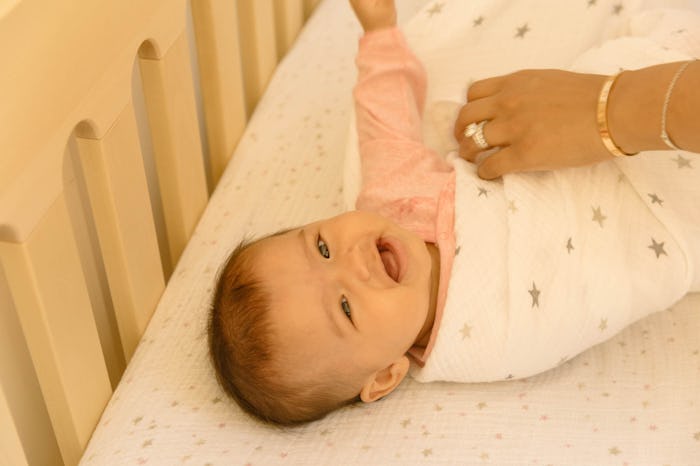Life
Why Your Baby Is Coughing, According To Science
One of the worst parts of parenting is dealing with a sick child, because no parent wants to see their child in pain. But with all the bacteria and viruses that surround them, inevitably babies will end up getting sick every now and then. The common cold is often accompanied by a variety of symptoms, and if you've noticed your baby has a tickle in their throat, you might wonder, "why is my baby coughing?" Is it a cold or something else? With babies, it's hard to tell what is causing the cough, because they can't verbally communicate to you what they're feeling.
It's important to understand what causes a cough in the first place. According to the Mayo Clinic, coughing is your body's reaction to the irritation of air passages, sometimes from mucus or a piece of food. When nerve endings in your throat, lungs, or windpipe sense irritation, your body's reflex is to force out air through its air passages. There are two types of coughs to look for in your baby, explained Parents — a wet cough, which is usually a result of a bacterial infection and is accompanied by phlegm or mucus, or a dry cough, which is caused by a cold or allergies that irritate the throat.
But there are a few things that could be causing your baby's cough besides irritation. Just remember that it is best to get your baby evaluated by their doctor so they can offer you the best clinical diagnosis and treatment.
Common Cold Or Flu
It's the villain that hits every family, especially during winter when cold and flu viruses thrive. According to Parents, a cold or flu produces a dry hacking cough, which is usually accompanied by a stuffy or runny nose, sore throat, and mild fever. In babies younger than 4 months, noted Parents, a cough is not common and could lead to croup or pneumonia. If symptoms of the cold or cough worsen, you should call your doctor.
Croup
Croup, according to the Mayo Clinic, often starts as a cold or viral infection, but develops in to a loud barking cough that is worse at night, and can last anywhere from three to five days. The Mayo Clinic further advised that if croup gives your child more troublesome breathing, or they start to turn blue, you should immediately call your doctor.
Bronchiolitis
Bronchiolitis, not to be confused with bronchitis, is an upper respiratory virus, according to the American Academy of Pediatrics (AAP), and starts with cold symptoms. It can end up causing your baby to have faster, harder breathing, can make it difficult for them to swallow or suckle, can cause them to make a whistling sound when they breathe out, and can cause a bluish tint around their lips from lack of air. Bronchiolitis is serious, and can lead to dehydration, so a trip to the doctor's office is crucial if you see any signs.
Asthma
According to the Asthma and Allergy Foundation of America (AAFA), babies with asthma experience a cough with fast, labored breathing, wheezing, difficulty eating or suckling, and can turn pale or blue in the face or fingernails. The AAFA also noted that because asthma symptoms are so similar to other respiratory issues, it is important to have a doctor evaluate your baby.
Pneumonia
As explained by Baby Center, there are two types of pneumonia — bacterial pneumonia and viral pneumonia. Bacterial pneumonia is when babies have a sudden onset of symptoms, including a wet cough with phlegm, trouble breathing, vomiting and diarrhea, and weakness with a high fever. Viral pneumonia has similar but less severe symptoms. Baby Center further noted that if your baby has bacterial pneumonia, your doctor may need to prescribe antibiotics to treat it.
Whooping Cough
Whooping cough, also called pertussis, is a contagious infection that is dangerous for babies, according to the Centers for Disease Control and Prevention (CDC), and causes babies to produce a a loud, violent cough that sounds like a "whoop." It gets progressively worse, but starts out with simple cold symptoms. The CDC further explained that it is very important for your baby to get the DTaP vaccine, which was made to prevent and protect against whooping cough.
Of course, if your child has one cough throughout the day or coughs after sputtering from a bottle, it doesn't necessarily mean anything is wrong. Just listen out to your baby's coughing and put a call into your doctor if you think it's something beyond a little throat irritation.
This article was originally published on
